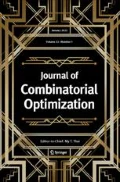Abstract
Energy conservation in mobile ad hoc networks is of paramount importance because most mobile nodes usually have very limited energy supply. Previous research on this issue focused on the design at the network or MAC or physical layer. In this paper, we study this problem from the new perspective of node mobility, i.e., analyzing the impact of node movement on energy conservation. In particular, armed with the inherent resource heterogeneity in mobile ad hoc networks, we propose a novel resource-aware movement strategy to make better use of some powerful nodes to achieve energy conservation. We also formulate the resource-aware movement as a NP-complete distance-constrained least-cost (DCLC) routing problem and propose an efficient heuristic solution. Extensive simulations have been used to demonstrate the effectiveness of the proposed schemes.
Similar content being viewed by others
References
Albert R, Barabsi A.-L (2002) Statisctical mechanics of somplex networks. Review of Modern Physics 47–97.
Chakraborty S, Yau DKY, Lui JCS (2003) On the effectiveness of movement prediction to reduce energy consumption in wireless sommunication (extended abstract). ACM SIGMETRICS'03, Aan Diego, CA
Feeney LM, Nilsson M (2001) Investigating the energy consumption of wireless network interface in an ad hoc networking environment. INFOCOM 2001 pp. 1548–1557
Garey MR, Johnson DS (1979) Computer and intractability: A guide to the theory of NP-completeness. Freeman, San Francisco
Grossglauser M, Tse DNC (2002) Mobility increase the capacity of ad-hoc wirelss networks. In Proceedings of IEEE INFOOCM'00, Tel Aviv, Israel, pp. 1360–1369
Glodenberg DK, Lin J, Morse AS, Rosen BE, Yang YR (2004) Towards mobility as a network control primitive. In Proceedings of ACM MobiHoc'04, Roppongi, Japan, pp. 163–173
Johnson DB, Maltz DA (1996) Dynamic source routing in ad hoc wireless networks. In: Imielinski and Korth (eds), Mobile Computing. Kluwer Academic Publishers, p. 353
Liu W, Zhang Y, Lou W, Fang Y (2004) DELAR: Device-energy-load aware relaying framework in heterogeneous wirless ad hoc networks. IEEE Milcom 2004
Liu W, Lou W, Fang Y (2005) An efficient QoS routing algorithm for delay sensitive applications. Computer Networks 47(1):87–104
Reeves DS, Salama HF (2000) A distributed algorithm for delay-constrained unicast routing. IEEE/ACM Transaction on Networking. 8(2):230–250
Yoon J, Liu M, Noble B (2003) Sound mobility models. In Proc. of ACM MobiCom'03. September 2003, San Diego, CA
Ye Z, Krishnamurthy SV, Tripathi SK (2003) A framework for reliable routing in mobile ad hoc networks. INFOCOM 2003
Zhao W, Ammar M, Aegura E (2004) A Message Ferry Approach for Data Delivery in Sparse Mobile Ad Hoc Networks. ACM MobiCom'04, pp. 187–198
Author information
Authors and Affiliations
Corresponding author
Rights and permissions
About this article
Cite this article
Liu, W., Zhang, Y., Fang, Y. et al. Energy conservation through resource-aware movement in heterogeneous mobile ad hoc networks. J Comb Optim 11, 7–20 (2006). https://doi.org/10.1007/s10878-006-5974-y
Accepted:
Issue Date:
DOI: https://doi.org/10.1007/s10878-006-5974-y



